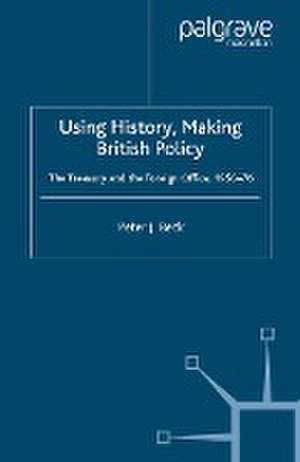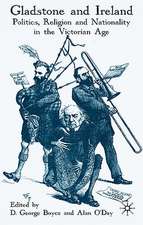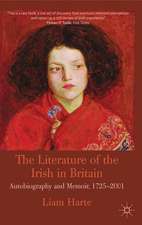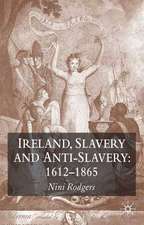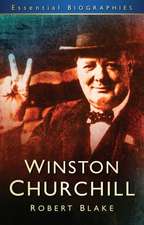Using History, Making British Policy: The Treasury and the Foreign Office, 1950-76
Autor P. Becken Limba Engleză Paperback – 2006
| Toate formatele și edițiile | Preț | Express |
|---|---|---|
| Paperback (1) | 387.96 lei 6-8 săpt. | |
| Palgrave Macmillan UK – 2006 | 387.96 lei 6-8 săpt. | |
| Hardback (1) | 392.37 lei 6-8 săpt. | |
| Palgrave Macmillan UK – 11 iul 2006 | 392.37 lei 6-8 săpt. |
Preț: 387.96 lei
Nou
Puncte Express: 582
Preț estimativ în valută:
74.26€ • 80.69$ • 62.42£
74.26€ • 80.69$ • 62.42£
Carte tipărită la comandă
Livrare economică 21 aprilie-05 mai
Preluare comenzi: 021 569.72.76
Specificații
ISBN-13: 9781349524099
ISBN-10: 1349524093
Pagini: 310
Ilustrații: XII, 310 p.
Dimensiuni: 140 x 216 mm
Greutate: 0.41 kg
Ediția:1st ed. 2006
Editura: Palgrave Macmillan UK
Colecția Palgrave Macmillan
Locul publicării:London, United Kingdom
ISBN-10: 1349524093
Pagini: 310
Ilustrații: XII, 310 p.
Dimensiuni: 140 x 216 mm
Greutate: 0.41 kg
Ediția:1st ed. 2006
Editura: Palgrave Macmillan UK
Colecția Palgrave Macmillan
Locul publicării:London, United Kingdom
Cuprins
List of Tables and Boxes Preface Acknowledgements List of Abbreviations PART I: INTRODUCTION: USING HISTORY IN BRITAIN British Policymakers and History Using Official Histories and Public Records to Present Britain's Past to a Global Audience PART II: USING HISTORY IN THE TREASURY The Treasury Becomes 'Very Historically Minded' 1957-1960 Pushing Ahead with 'Funding Experience', 1960-62 The Public Enterprises Division (PE) as a Case Study, 1962-65 The 'New Stage' in the Treasury's Historical Work, 1965-68 Retuning the Treasury's Historical Activities after Fulton, 1968-70 Moving Towards the Closure of the Treasury's Historical Section, 1971-76 Using History in the Treasury PART III: USING HISTORY IN THE FOREIGN OFFICE The Foreign Office's 1962 Abadan History Using Butler's Abadan History to Reappraise British Foreign Policy Using History in the Foreign Office PART IV: CONCLUSION Making British Policy, Using and Ignoring History Appendix: Treasury Historical Memoranda Notes Select Bibliography Index
Recenzii
'This interesting, well-written and clearly-organised book will be of value to those interested in British governmental policymaking in the third quarter of the last century and, more generally, to those concerned with the potential relevance of historical study in the public sphere.
'Drawing on a wide range of sources and reflecting a sound grasp of administrative practice and culture, Beck ably demonstrates the extent of the neglect by government in its deliberations of the historical work it had commissioned. His meticulous scholarship demonstrates that, despite claims of the value of the historical perspective, policy, instead, was the function of what was negotiable within Whitehall.
'At times, the perspective seems very recent. The historical report on what Burke Trend termed the deplorable history of the Festival Gardens project, established as part of the 1951 Festival of Britain, would have been useful reading for those considering the Millennium Dome. Similarly, Rohan Butler's 1962 History of the Abadan Crisis of 1951 offers an interesting viewpoint on the more recent Iraq crisis'
'This first-rate study deserves wide attention as an exemplary treatment of its subject.' - Professor Jeremy Black, University of Exeter, and author of Using History (2005).
'Beck's book draws into question the practicality of marrying history with policy making. It provides case studies into the limited abilities of academic historians to write administrative histories. Additionally, it serves as an implicit warning to historians who seek to make history the justifier of war or specific policy. Should historians stay away from political debates? This book does not seek to answer that question. The question it does ask how did the British government use histories to determine policy - should at least make people and policy makers think twice before calling for or writing individual histories to explain everything. In the end Beck achieves for policy makers what a positive historical narrative could not: doubt about the uses of history in policy. Paradoxically, this solidly written book provides exceedingly practical lessons to historians and policy makers alike.' - British Scholar (Book of the Month)
'Quite apart from illuminating my father's career, most notably his belief in the value of the historical dimension in the conduct of government, this book reminds policymakers like me about the merits of making history a more significant part of the policymaking process. At the same time, by pointing to the frequent tendency merely to pay lip service to the concept, the book makes policymakers more aware of the constant need to overcome the difficulties of using history in government.'' - Charles Clarke, Home Secretary in the Blair Government, 2004-2006
'A fascinating and genuinely original study by Peter Beck...He has researched the subject thoroughly in The National Archives and among private papers, he writes in a lucid style and...he has succeeded in opening up an area about which most historians of post-war Britain have hitherto said little. Indeed, this is a book that could be read with profit by a wide range of historians...because it raises questions about the value and application of history in the modern world.' Professor John Young, University of Nottingham, Archives: The journal of the British Records Association
'Drawing on a wide range of sources and reflecting a sound grasp of administrative practice and culture, Beck ably demonstrates the extent of the neglect by government in its deliberations of the historical work it had commissioned. His meticulous scholarship demonstrates that, despite claims of the value of the historical perspective, policy, instead, was the function of what was negotiable within Whitehall.
'At times, the perspective seems very recent. The historical report on what Burke Trend termed the deplorable history of the Festival Gardens project, established as part of the 1951 Festival of Britain, would have been useful reading for those considering the Millennium Dome. Similarly, Rohan Butler's 1962 History of the Abadan Crisis of 1951 offers an interesting viewpoint on the more recent Iraq crisis'
'This first-rate study deserves wide attention as an exemplary treatment of its subject.' - Professor Jeremy Black, University of Exeter, and author of Using History (2005).
'Beck's book draws into question the practicality of marrying history with policy making. It provides case studies into the limited abilities of academic historians to write administrative histories. Additionally, it serves as an implicit warning to historians who seek to make history the justifier of war or specific policy. Should historians stay away from political debates? This book does not seek to answer that question. The question it does ask how did the British government use histories to determine policy - should at least make people and policy makers think twice before calling for or writing individual histories to explain everything. In the end Beck achieves for policy makers what a positive historical narrative could not: doubt about the uses of history in policy. Paradoxically, this solidly written book provides exceedingly practical lessons to historians and policy makers alike.' - British Scholar (Book of the Month)
'Quite apart from illuminating my father's career, most notably his belief in the value of the historical dimension in the conduct of government, this book reminds policymakers like me about the merits of making history a more significant part of the policymaking process. At the same time, by pointing to the frequent tendency merely to pay lip service to the concept, the book makes policymakers more aware of the constant need to overcome the difficulties of using history in government.'' - Charles Clarke, Home Secretary in the Blair Government, 2004-2006
'A fascinating and genuinely original study by Peter Beck...He has researched the subject thoroughly in The National Archives and among private papers, he writes in a lucid style and...he has succeeded in opening up an area about which most historians of post-war Britain have hitherto said little. Indeed, this is a book that could be read with profit by a wide range of historians...because it raises questions about the value and application of history in the modern world.' Professor John Young, University of Nottingham, Archives: The journal of the British Records Association
Notă biografică
PETER J. BECK is currently Professor of International History at Kingston University, UK. He has published widely on the history of British foreign policy as well as the link between history and public policy, and served on the history panel for the 1992 and 1996 Research Assessment Exercises.
